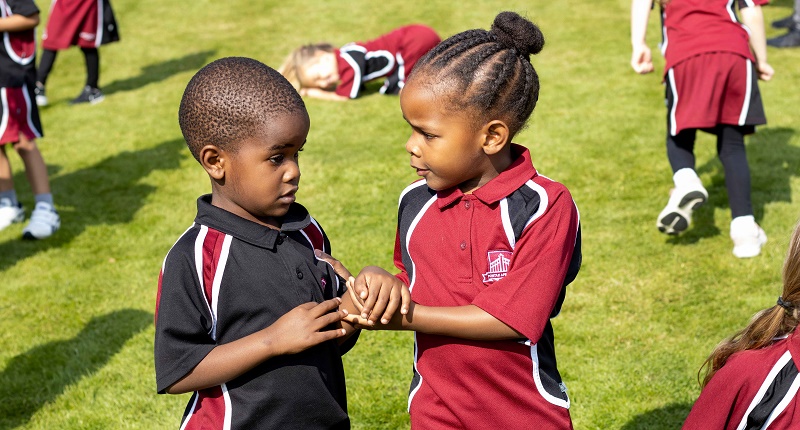


Find out how Gateways could provide the perfect educational environment for your child.
Find out more
Big enough to challenge, small enough to care

The Critical Importance of Reading
Mrs Sharrock is our chartered librarian and has over 35 years’ experience of encouraging the reading habit.
“Evidence suggests that there is a positive relationship between reading frequency, reading enjoyment and attainment (Clark 2011; Clark and Douglas 2011).”
(From: Department for Education (2012). Research evidence on reading for pleasure.)
Research over the last two decades has repeatedly shown the value of reading and particularly of reading for pleasure. At Gateways, we continually strive to emphasise these benefits and to inculcate an attitude that reading is critical for educational and emotional development, for expanding our awareness of the world around us, and perhaps, most importantly, that it is an enjoyable and entertaining activity that should lead to a life-long engagement with all aspects of the printed word.
I have found that the most effective approach to inspiring children and young people is to ensure that they are supported by all the adults around them. Staff throughout the school and across departments will recommend and promote reading for a whole range of reasons. It is equally important that parents, grandparents and other family members can do their bit too and join in with this passion for reading and developing the habit for life.
Below, you will find information and tips, links to resources and websites, and reviews that will help you to support your child to gain confidence in their reading and to develop a whole-family ethos of enjoying the printed word in a range of formats.
Why we all love reading
Here are just a few of the benefits of developing the reading habit for life:
Particular benefits for younger children
Even if your child cannot read yet, there are still significant benefits to reading to your child, and that includes very young babies!
Tips for encouraging reading
We all acknowledge that in a world full of other available activities and a range of technologies, it can be difficult to maintain the reading habit with your children, especially as they become young adults.
Try these tips for supporting and encouraging their reading:
Children with SEN
Some children may not access reading as easily as others and may not benefit from all of the suggestions already listed to encourage reading for pleasure.
These are recommendations and suggestions for supporting children with SEN:
The Rights of the Reader
In 2006 writer Daniel Pennac published a short book about why we read and why we don’t read. He prompts us to remember that there are no “rules” in reading for pleasure and that if we are to develop the reading habit we must not put undue pressure on to our children, otherwise reading will not be seen as an enjoyable experience.

Book Reviewing Journals & Websites
I use a range of reviewing journals when I am selecting books for the libraries in school. These are trusted and authoritative sources where the needs of the young reader are the focus and chief priority, and not the number of sales of particular titles. Supermarkets can be great places to buy a book, especially when you are busy, but do be aware that you will only see a very small range of the thousands of books published every year for children and young people, and often a very limited range of popular authors. These resources will help to broaden your knowledge of all that is available, and the current and popular trends within this field.
Easy to read, comprehensive and independent, it has been informing those who work with children and their families for over 38 years. Reviewers include children’s librarians, classroom teachers and expert critics from education and the literary world.
The largest children’s reading charity in the UK, producing resources to support the development of and love of reading. Offers booklists by age groups and themes, as well as the latest news on reading activities and book awards.
https://www.lovereading4kids.co.uk/
A colourful and lively site, allowing publishers to connect directly with book lovers and help young readers to discover new books and authors. Includes book reviews, opening extracts and recommendations.
https://www.clpe.org.uk/library/booklists
A charity for those involved in teaching literacy in Primary schools. The booklists within the Library section are particularly comprehensive and thought-provoking.
Book Awards
Following the wide range of book awards both within this country and around the world will further expand awareness and knowledge of some of the best and most innovative Fiction and Non-Fiction currently available for both children and adults.
https://www.carnegiegreenaway.org.uk/
Chosen by librarians working with children and young people. The Carnegie Award covers novels for children and young adults, the Greenaway Medal for the best picture books. Also includes the Amnesty CILIP Honour award which aims to celebrate our freedoms through outstanding children’s books and raise awareness of human rights.
Chosen by experienced and expert booksellers.
https://www.booktrust.org.uk/books/awards-and-prizes/
Nominated by publishers, with the shortlist judged by children
Includes categories for ages 7 and under, 7-12 and 12-16.
These websites will give you a full list of the range of awards for both children’s and adult Fiction, Non-Fiction and Information books.
https://www.waterstones.com/category/cultural-highlights/book-awards
https://www.foyles.co.uk/Public/Biblio/Prizes.aspx
Recommended Author Lists
I have created three ‘Recommended Author’ lists for different age groups with a list of different authors that would be perfect for pupils that age.